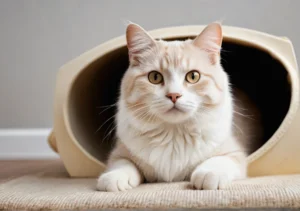Mother cats are known for their fierce protection of their kittens, but have you ever wondered why they exhibit this behavior? Let’s explore the reasons behind why mother cats protect their young.
Mother cats protect their kittens instinctively in order to ensure the survival of their offspring in the wild. This instinct is deeply ingrained in their behavior and is crucial for the well-being of their litter. The bond between a mother cat and her kittens is unbreakable, driving her to protect them at all costs.
Maternal Instincts
Mother cats are known for their strong maternal instincts that push them to protect their kittens fiercely. This instinct is deeply rooted in their biology, dating back to their wild ancestors who needed to ensure the survival of their offspring in harsh environments. Just like human mothers, mother cats are hardwired to care for and defend their young at any cost.
These instincts are triggered by a combination of hormonal changes and natural instincts that kick in once the kittens are born. The release of oxytocin, often referred to as the “love hormone,” plays a key role in bonding the mother cat to her newborns and heightening her protective instincts. This hormone helps create a strong emotional connection between the mother cat and her kittens, prompting her to prioritize their safety above all else.
Additionally, mother cats have a keen sense of smell that allows them to recognize their kittens from birth. This ability helps them distinguish between their own offspring and other cats, further strengthening their drive to protect their young. Their instinct to defend their kittens is a powerful force that compels them to act swiftly and decisively in the face of any perceived threat.
Sense of Vulnerability
Mother cats perceive their kittens as vulnerable and in need of protection from the moment they are born. Despite their small size and fragility, kittens are born with underdeveloped senses and motor skills, leaving them entirely dependent on their mother for survival. This reliance triggers a deep-seated instinct in mother cats to shield their kittens from harm and keep them safe from potential dangers.
The mother cat’s protective behavior is also influenced by her observation of the world around her. She is acutely aware of the risks posed by predators, other animals, and even humans, which can pose threats to her vulnerable kittens. This heightened sense of vigilance prompts the mother cat to stay alert and ready to defend her young at all times.
Moreover, mother cats have a remarkable ability to assess threats and anticipate potential dangers to their kittens. They rely on their instincts to evaluate the environment and make quick decisions to ensure the safety of their offspring. This keen sensitivity to their kittens’ needs drives them to act swiftly and assertively in the face of any perceived danger.
Remember that mother cats’ protective instincts are a natural and essential part of ensuring the survival of their kittens in the wild. By understanding and respecting these instincts, we can better support mother cats in their role as nurturers and guardians of their precious young.
Threat Perception
Mother cats have an innate ability to assess potential threats to their kittens. They rely on their keen senses of smell, sight, and hearing to detect any danger lurking nearby. If they sense a predator or any other potential harm, they immediately go into protective mode. Their maternal instincts kick in, prompting them to defend their vulnerable young ones at all costs. It’s truly a remarkable display of love and devotion.
Communication with Kittens
Mother cats communicate with their kittens through a variety of ways to ensure their safety and well-being. From gentle licks to comforting purrs, these feline mothers express their love and care through physical touch and sounds. They use body language to guide and comfort their kittens, as well as vocalizations to alert them to potential dangers. It’s all part of the intricate bond between mother and offspring, ensuring the kittens grow strong and healthy under their watchful eye.
- Eye contact: Mother cats use eye contact to establish a connection with their kittens and convey reassurance.
- Grooming: Regular grooming sessions not only keep the kittens clean but also help the mother bond with her young ones.
- Purring: The soothing sound of a mother cat’s purr has a calming effect on her kittens, promoting a sense of security and contentment.
- Carrying: Mother cats often carry their kittens in their mouths to move them to safer locations or teach them important skills.
For more information on the importance of maternal care, consider checking out this helpful resource.
Training and Guidance
Mother cats play a crucial role in training and guiding their kittens, imparting essential survival skills to them. From teaching them how to hunt for food to grooming techniques, mother cats pass on vital knowledge that will help their offspring thrive in the wild. By providing guidance and discipline, mother cats help shape the behavior of their kittens, ensuring they can navigate the world confidently on their own.
Sacrifices for Offspring
Mother cats make countless sacrifices for their kittens, showcasing the depth of their love and dedication to their young. From risking their own safety to protect their kittens from predators to hunting tirelessly to provide food for their litter, mother cats put their offspring’s well-being above their own. Their selfless acts of sacrifice demonstrate the unwavering bond between mother and kitten, highlighting the powerful instinct to nurture and protect their young at all costs.
Additional Insight:
- Mother cats also protect their kittens by creating a safe and secure nesting area, shielding them from harm and adverse weather conditions. By building a cozy nest and strategically placing it out of harm’s way, mother cats ensure their kittens are sheltered and protected from potential dangers in their environment. This maternal instinct to create a safe haven for their young reflects the innate drive to safeguard their offspring from harm, demonstrating the lengths to which mother cats will go to ensure the well-being of their kittens.
Remember, mother cats instinctively protect and care for their kittens, showcasing a remarkable display of maternal love and dedication.
Protective Behaviors
Mother cats are known for their unwavering commitment to protecting their kittens. One prevalent protective behavior is how they will fiercely defend their young against any perceived threat, whether real or imagined. This includes hissing, growling, or even attacking if they feel their kittens are in danger. Additionally, mother cats will carefully groom and clean their kittens to keep them safe from predators by removing their scent. They will also create a safe space for their kittens, often choosing hidden or secluded areas to nest. In extreme cases, mother cats may even risk their own lives to ensure the safety of their offspring, demonstrating the depth of their protective instincts.
Interesting Facts
Did you know that mother cats have a remarkable ability to detect danger? They are incredibly attuned to their surroundings and can sense threats long before humans or even other animals. This heightened sense of awareness allows them to take quick action to safeguard their kittens from harm. Another fascinating fact is that mother cats have a unique form of communication with their young. Through gentle chirps, trills, and purrs, they can reassure their kittens and signal that everything is okay. This bond is crucial for the kittens’ development and helps them feel secure in their mother’s presence. Additionally, mother cats will often teach their kittens essential life skills, such as hunting and grooming, contributing to their survival in the wild.
Extra Insight: Mother cats have an incredible memory and can remember specific scents and sounds associated with danger. This allows them to avoid potential threats and keep their kittens safe in various environments.
Alex, a passionate animal lover, has experience in training and understanding animal behavior. As a proud pet parent to two dogs and three cats, he founded AnimalReport.net to share insights from animal experts and expand his knowledge of the animal kingdom.




